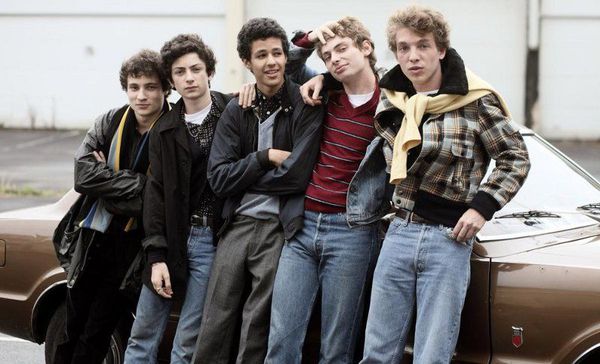Eye For Film >> Movies >> My Golden Days (2015) Film Review
My Golden Days
Reviewed by: Anne-Katrin Titze

The sound of a flock of birds, taking off to visit faraway lands, remember? What are the sounds of your childhood? Say it thrice, for good luck. "I remember, I remember, I remember." In Arnaud Desplechin's magical hands, all traces of cliché vanish, even though some of the recalled souvenirs are as old as eternity.
My Golden Days (Trois Souvenirs De Ma Jeunesse) bursts with life by weaving a golden braid of adventure and responsibility, and is a highlight of this year's New York Film Festival. Lost in the English title is the focus on memory and the loaded number three. What do we recall of our most personal past, and how? Truth has many faces and answers come with every piece of clothing, in every word of spoken and unspoken dialogue co-written with Julie Peyr.

Three defining chapters in the youth of recurring Desplechin hero, Paul Dédalus (played by Mathieu Amalric in his adult form), make him live up to his name - both as mythical constructor of the labyrinth and the wings to escape it, as well as Joyce's alter-ego set to take flight.
After an episode titled Childhood, (Paul as a little boy is played by Antoine Bui) appropriately spotty and pointed, as early memories tend to be, the chapter called Russia twists the hero into a Cold War teenage spy story. A nameless agent played by André Dussollier, as if he were a deity from a Lubitsch designed netherworld, talks with Dédalus about a his "twin" and a high school trip to Minsk.
Part three is the story of a great love and the conflicts of an anthropologist. Carefully chosen details speak volumes. Partly chewed-off pink nail polish talks unobtrusively of self confidence and dread. A black armband, five years after a death signals a loss unmourned. The epilogue is a wonderful showdown and an epic, verbal confrontation about the nature of integrity.
Paul's mother (Cécile Garcia-Fogel) is an active absence, his father (Olivier Rabourdin) a traveling man. Although he is "not his brother's keeper," (Ivan played by Raphaël Cohen) nor his sister Delphine's (Lily Taieb) confidant, the siblings seem close. His great-aunt's (Françoise Lebrun) lover, a woman (Irina Vavilova) who fled to France in the 1950s, teaches them Russian and some rules about the way of the world. "Men have to do things and women flee."
Wrapped in a white shirt, red jacket, long bare legs dangling, a woman (Dinara Drukarova) smiles with such sweet sorrow as she arranges her lover's return to France. We might want to link this early scene with a terrific two-part slapstick seduction involving another woman and a skirt, part Bringing Up Baby dress emergency, part bold surprise.
Teenage Paul (Quentin Dolmaire) has always had an affinity for plaid and he wears his Durham Barbour jacket during much of his late adolescence. When memory dresses people, they tend to wear the same things that represent them at the time - unless you are a fashion mnemonist. A red polka-dotted blouse and a mother's pearl necklace connect the dots of affection.
Heroic tasks, a common dream of youth, become reality in the second part of the film. This great courage informs but in no way prepares our hero for the siren call he cannot resist. Esther (Lou Roy-Lecollinet), long blond provincial Eighties hair, mini skirt, pouty lips and a knowing smile is convinced of her allure. "You'll never forget me," she says to him when they first speak. Right from the start, it is memory that is at stake. The young actors are so assured together that you forget they are acting. "I never loved my mother," says Paul. "I'm scared when you're gone," says Esther, furor intact.
Paul, leaving the provincial town of Roubaix (where the director himself was born and grew up) to study anthropology in Paris, comes up with the best argument ever to get into a popular professor's class. "Your students are brilliant. You need one less brilliant student," he advertises himself and makes her laugh.
Cloth samples everywhere in Esther's family home and a great big green neon sign in the shape of scissors, indicate her parents' background. Symbolism never distracts from the emotional impact, quite the opposite is true. The mythical qualities of quotidian life slip even more into focus. A western watched on TV descends on Roubaix when three guys come by to beat up Paul.
Grégoire Hetzel, the specialist of juxtapositions, helped make Cédric Anger's anatomy of a murderer, Next Time I'll Aim For The Heart (La Prochaine Fois Je Viserai Le Coeur), and Mathieu Amalric's chronicle of fluid crime, The Blue Room (La Chambre Bleue), such extraordinary thrillers. With Desplechin he has a history of creating divine musical memories.
In 2013, the director explained to me the cinematic tradition of the failure to save a woman. Desplechin, like no other, startles with his enigmatic perceptions on the gender divide. My Golden Days tells of women who don't know how to live and of men who flee and flee and flee from them.
Reviewed on: 27 Sep 2015














